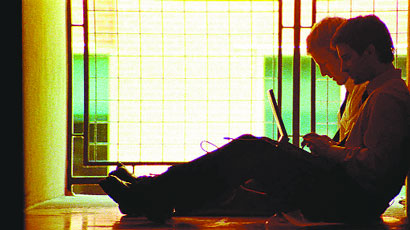Science fiction invades a flick! Steals the story!
First-time American filmmakers usually don’t aim very high. Since Sundance and Miramax have turned “independent film” into a niche market and venue for studio audition tapes, their ranks are filled with post-Tarantino crime dramas and navel-gazing portraits of slacker’s love lives.
“Primer,” which won the Grand Prize at last winter’s Sundance, is an exception. For one, it’s science fiction. Made on a four-figure budget, it includes no special effects. Over the past few years, films like Steven Soderbergh’s “Solaris” remake, Michael Winterbottom’s “Code 46” and Michel Gondry’s “Eternal Sunshine of the Spotless Mind” have forged a low-key resurgence of the sci-fi art movie. “Primer” is at least as ambitious as any of those works and takes more chances as a narrative. Unfortunately, Shane Carruth has bitten off more than he chew. As a storyteller, his ambition gets the better of him.
Abe (David Sullivan) and Aaron (Carruth) are engineers who spend their nights working on inventions in Aaron’s garage. Their latest product, a mysterious box, is their most promising. Blocking the effects of gravity, it reduces the mass of any object inside it. When Aaron puts a toy in it, he discovers it changed into a fungal growth that should have taken many years to emerge
Placing a wristwatch within proves that the device can be used as a time machine. Moving to a U-Haul storage facility, Abe devises a larger version and experiments with it. He travels into the past. While Abe and Aaron are careful not to change anything significant, their voyages, which they plan to use to get rich on the stock market, are more complicated than they initially appear. Their “doubles” still exist and wind up competing with them.
For all its flaws, “Primer” is an impressive debut. Significantly, it distinguishes itself from its Sundance peers—it was shot on 16mm film, rather than video. Carruth’s choice of camera angles is consistently inventive and thoughtful. The cinematography is extremely grainy, but it has real texture and presence. It’s raw, not pretty, but it’s not ugly either. Given that a film as inferior-looking as “Pieces of April” can now gross several million dollars and get an Oscar nomination, that’s no small feat.
A one-man band, Carruth directed, wrote, edited, produced, composed the score and acted in the film.
The first half of “Primer” captures passionate geekdom better than anything this side of novelist Richard Powers’ work. Abe and Aaron wear white shirts, ties and black slacks, as if they’re always at work. The dialogue is full of scientific jargon, which the sound design combines with piano music and background noise. Abe and Aaron’s excitement is contagious, even if one isn’t always sure what they’re talking about. That may be because they are not so sure what they’re doing—for a long time, they’re just as much in the dark as the viewer.
The plot builds from there, becoming increasingly problematic. Some films, like Takashi Shimizu’s “Ju-On: The Grudge,” have successfully used non-linear storytelling to enhance their atmosphere and contribute to their scares. However, in “Primer,” understanding the narrative is key to getting something out of the film. On a single viewing, it’s incomprehensible, and when it does make sense, there’s little substance beyond a facile moral about greed destroying friendship.
Certainly, Carruth builds a mood of paranoid anxiety, which gets worse each time one of the guys uses the time machine. However, he’s fallen prey to the imitative fallacy, making a confusing film about confusion. The story unfolds captivatingly, but by the time it comes around to a violent incident at a party, I had stopped caring what happened to these characters. “Primer” is an honorable failure, but it’s not much more pleasurable to watch than the dismal sequels to “The Matrix.”



































